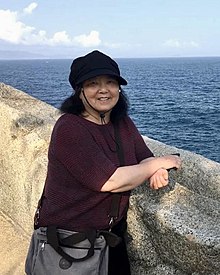
Back فانغ فانغ Arabic Фанг Фанг BE-X-OLD Fang Fang Catalan Fang Fang German Fang Fang Spanish Fang Fang French Fang Fang ID Fang Fang Italian 方方 Japanese Fang Fang Malay
Fang Fang | |||||||
|---|---|---|---|---|---|---|---|
 | |||||||
| Native name | 方方 | ||||||
| Born | Wang Fang (汪芳) 11 May 1955 Nanjing, China | ||||||
| Occupation | Writer | ||||||
| Language | Chinese | ||||||
| Alma mater | Wuhan University | ||||||
| Years active | 1982–present | ||||||
| Notable works | Feng Shui (万箭穿心) Bare Burial (软埋) Wuhan Diary | ||||||
| Notable awards | Lu Xun Literary Prize | ||||||
| Chinese name | |||||||
| Chinese | 方方 | ||||||
| |||||||
Fang Fang (Chinese: 方方), pen name of Wang Fang (汪芳; born 11 May 1955), is a Chinese writer, known for her literary depictions of the working poor. She won the Lu Xun Literary Prize in 2010. Born in Nanjing, she attended Wuhan University in 1978 to study Chinese. In 1975, she began to write poetry and in 1982, her first novel was published. She has since written several novels, some of which have been honored by Chinese national-level literary prizes.[1] Fang garnered international attention for her Wuhan Diary, documenting the early stages of the COVID-19 pandemic in China, and has used her platform to call for an end to internet censorship in China.[2]
- ^ Sina.com, Article on Fang Fang (in Chinese, Google English translation)
- ^ Kiki Zhao (14 February 2020). "The Coronavirus Story Is Too Big for China to Spin". The New York Times.